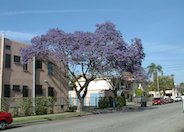
Common name:Jacaranda
Botanical name:Jacaranda mimosifolia
This irregular to rounded deciduous tree will reach about 40' tall and has fine, compound green leaves with blue flowers. Jacaranda's main blooming season is in spring and summer, but it will often produce sporadic blooms in fall as well.
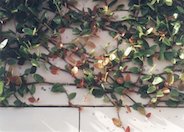
Common name:Creeping Fig
Botanical name:Ficus pumila
This is one of the few plants that can attach itself securely to wood, masonry, or metal. Because there is no limit to its size, it can overcome an entire buliding. It is most often found in colder climates. This vine will not climb on the south or west walls.
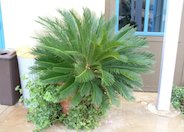
Common name:Sago-Palm
Botanical name:Cycas revoluta
Sago Palm resembles small palms; it is evergreen. It can slowly grow to 10'. It is used for a tropical effect and also looks great in planters. In the low desert, light shade and additional moisture are best. Side sprouts can form multi-trunked individuals. Apply fertilizer at leaf expansion. This plant has few pests.
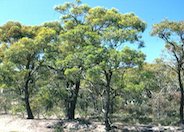
Common name:Red Ironbark, Pink Ironbark
Botanical name:Eucalyptus sideroxylon
This evergreen tree may reach a height of 60'-75'. It has slender, lance-shaped leaves found on somewhat pendulous branches. The bark is a deep red-brown color. In the winter, the leaves turn a reddish-pink color. Flowers are red to pink. This tree needs full sun.
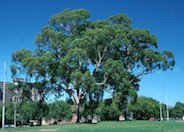
Common name:Lemon Scented Gum
Botanical name:Eucalyptus citriodora
This tall, narrow, open tree has a trunk that is smooth, white and "muscular," producing light green leaves with a heavy lemon scent when crushed. It quickly reaches a height of 60' or more. Below a temperature of 25 degrees F, the tree will be damaged by frost. Eucalyptus varieties are highly combustible -Monterey Bay Nursery

Common name:Golden Wattle
Botanical name:Acacia longifolia
This Acacia is a fast growing, evergreen shrub/ small tree growing 20' tall and equally wide. It can be used successfully as a screen. Flower heads are narrow, tubular, bright yellow, appearing in winter and are fragrant. It is used for its fast growth and screening possibilities more than for its bloom. It does need room to grow.
| Designer: Gabriela Yasiz | Med More 5 |
Photographer: GardenSoft |
Soils and Compost:
Maintain a two to four inch layer of mulch on the soil surface to reduce weeds, infiltrate rain water, and reduce compaction.
Water Saving Tip:
Be sure to fix all leaks promptly no matter how small they may seem.
Integrated Pest Management:
Attract, or buy beneficial insects such as ladybugs and lacewings to control pest outbreaks in your garden.
